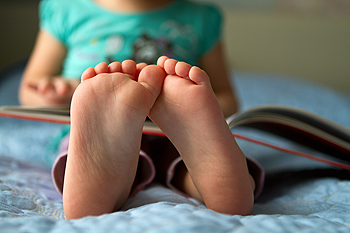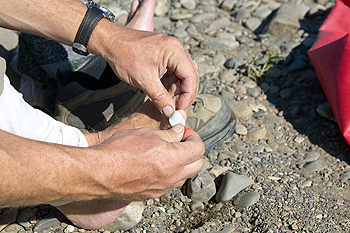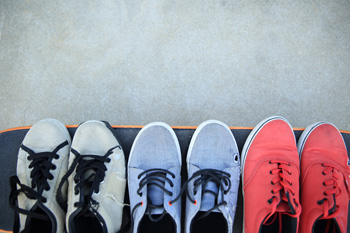 A common ailment that many diabetics have are foot problems; managing blood glucose levels, however, may help to keep the feet healthy. When nerve damage occurs in diabetics, it may cause pain and tingling, including possible numbness in the foot. Serious infections may be the result of this and can possibly lead to gangrene. It’s important to manage your diabetes; this may involve following a foot care plan. It’s crucial to check your feet daily, which will enable you to notice problems before they get worse. Some conditions to look for may be cuts, sores, or ingrown toenails. Washing your feet regularly will help you become aware of these issues. Trimming the toenails straight across the toe with clippers can help prevent the skin from being cut and can keep the toenails healthy. Consult with a podiatrist for a proper diagnosis and to learn of the treatment options available for diabetic feet.
A common ailment that many diabetics have are foot problems; managing blood glucose levels, however, may help to keep the feet healthy. When nerve damage occurs in diabetics, it may cause pain and tingling, including possible numbness in the foot. Serious infections may be the result of this and can possibly lead to gangrene. It’s important to manage your diabetes; this may involve following a foot care plan. It’s crucial to check your feet daily, which will enable you to notice problems before they get worse. Some conditions to look for may be cuts, sores, or ingrown toenails. Washing your feet regularly will help you become aware of these issues. Trimming the toenails straight across the toe with clippers can help prevent the skin from being cut and can keep the toenails healthy. Consult with a podiatrist for a proper diagnosis and to learn of the treatment options available for diabetic feet.
Diabetic foot care is important in preventing foot ailments such as ulcers. If you are suffering from diabetes or have any other concerns about your feet, contact Brent Harwood, DPM from Southeast Podiatry. Our doctor can provide the care you need to keep you pain-free and on your feet.
Diabetic Foot Care
Diabetes affects millions of people every year. The condition can damage blood vessels in many parts of the body, especially the feet. Because of this, taking care of your feet is essential if you have diabetes, and having a podiatrist help monitor your foot health is highly recommended.
The Importance of Caring for Your Feet
Patients with diabetes should have their doctor monitor their blood levels, as blood sugar levels play such a huge role in diabetic care. Monitoring these levels on a regular basis is highly advised.
It is always best to inform your healthcare professional of any concerns you may have regarding your feet, especially for diabetic patients. Early treatment and routine foot examinations are keys to maintaining proper health, especially because severe complications can arise if proper treatment is not applied.
If you have any questions please feel free to contact one of our offices located in Fairhope, Brewton, and Atmore, AL . We offer the newest diagnostic and treatment technologies for all your foot care needs.
Read more about How to Care for Diabetic Foot Athlete’s foot is a fungal infection that affects the skin on the foot. While generally not a serious condition, it can be bothersome and is contagious. As a parent, making sure your children maintain proper foot care is an important step in preventing ailments like athlete’s foot. Here are some steps that you should teach your children to help prevent athlete’s foot. Make sure that they wear flip-flops or sandals in public bathrooms and around pools. When they are drying their feet, make sure they dry in between their toes, as athlete’s foot often occurs in this area. Keep your house and their play areas clean. Teach them to not share some items like towels or shoes, as these items may be contaminated already. Finally, check their feet for any symptoms of athlete’s foot such as redness, itchiness, or scaly skin.
Athlete’s foot is a fungal infection that affects the skin on the foot. While generally not a serious condition, it can be bothersome and is contagious. As a parent, making sure your children maintain proper foot care is an important step in preventing ailments like athlete’s foot. Here are some steps that you should teach your children to help prevent athlete’s foot. Make sure that they wear flip-flops or sandals in public bathrooms and around pools. When they are drying their feet, make sure they dry in between their toes, as athlete’s foot often occurs in this area. Keep your house and their play areas clean. Teach them to not share some items like towels or shoes, as these items may be contaminated already. Finally, check their feet for any symptoms of athlete’s foot such as redness, itchiness, or scaly skin.
Athlete’s foot is an inconvenient condition that can be easily reduced with the proper treatment. If you have any concerns about your Feet, contact Brent Harwood, DPM from Southeast Podiatry. Our doctor will treat your foot care needs.
Athlete’s Foot: The Sole Story
Athlete's foot, also known as tinea pedis, can be an extremely contagious foot infection. It is commonly contracted in public changing areas and bathrooms, dormitory style living quarters, around locker rooms and public swimming pools, or anywhere your feet often come into contact with other people.
Solutions to Combat Athlete’s Foot
Athlete’s foot can cause many irritating symptoms such as dry and flaking skin, itching, and redness. Some more severe symptoms can include bleeding and cracked skin, intense itching and burning, and even pain when walking. In the worst cases, Athlete’s foot can cause blistering as well. Speak to your podiatrist for a better understanding of the different causes of Athlete’s foot, as well as help in determining which treatment options are best for you.
If you have any questions please feel free to contact one of our offices located in Fairhope, Brewton, and Atmore, AL . We offer the newest diagnostic and treatment technologies for all your foot care needs.
Read more about Athlete's Foot Hiking is a fun, safe, and healthy activity when proper precautions are taken. Here are some tips to help prevent foot injuries while out on the trails. Try not to overpack; take only what is necessary, as this can help take pressure off your feet. If you do go hiking, make sure to wear hiking boots as these are developed to offer more grip and cushioning than a sneaker. To prevent blisters, use moleskin, tape, or even bandages on areas where friction is likely. Wear moisture wicking socks to help keep your feet dry, further helping in the prevention of blisters. Finally, tools like hiking poles can help provide stability and take some weight off your back, so it's not a bad idea to bring a pair. By following these tips, you can help reduce the likelihood of falls and foot injuries. If you happen to hurt your feet while hiking, be sure to see a podiatrist so that you can be diagnosed and cared for properly.
Hiking is a fun, safe, and healthy activity when proper precautions are taken. Here are some tips to help prevent foot injuries while out on the trails. Try not to overpack; take only what is necessary, as this can help take pressure off your feet. If you do go hiking, make sure to wear hiking boots as these are developed to offer more grip and cushioning than a sneaker. To prevent blisters, use moleskin, tape, or even bandages on areas where friction is likely. Wear moisture wicking socks to help keep your feet dry, further helping in the prevention of blisters. Finally, tools like hiking poles can help provide stability and take some weight off your back, so it's not a bad idea to bring a pair. By following these tips, you can help reduce the likelihood of falls and foot injuries. If you happen to hurt your feet while hiking, be sure to see a podiatrist so that you can be diagnosed and cared for properly.
Blisters are prone to making everyday activities extremely uncomfortable. If your feet are hurting, contact Brent Harwood, DPM of Southeast Podiatry. Our doctor can provide the care you need to keep you pain-free and on your feet.
Foot Blisters
Foot blisters develop as a result of constantly wearing tight or ill-fitting footwear. This happens due to the constant rubbing from the shoe, which can often lead to pain.
What Are Foot Blisters?
A foot blister is a small fluid-filled pocket that forms on the upper-most layer of the skin. Blisters are filled with clear fluid and can lead to blood drainage or pus if the area becomes infected.
How Do Blisters Form?
Blisters on the feet are often the result of constant friction of skin and material, usually by shoe rubbing. Walking in sandals, boots, or shoes that don’t fit properly for long periods of time can result in a blister. Having consistent foot moisture and humidity can easily lead to blister formation.
Prevention & Treatment
It is important to properly care for the affected area in order to prevent infection and ease the pain. Do not lance the blister and use a Band-Aid to provide pain relief. Also, be sure to keep your feet dry and wear proper fitting shoes. If you see blood or pus in a blister, seek assistance from a podiatrist.
If you have any questions, please feel free to contact one of our offices located in Fairhope, Brewton, and Atmore, AL . We offer the newest diagnostic and treatment technologies for all your foot care needs.
Read more about Blisters on the Feet Sometimes, the more options to choose from, the tougher it is to decide. Running shoes fall right into this category; with so many choices out there, it can be hard to find the right pair. There are some things to look for that should narrow down the search. First, look for a shoe that will work in whatever terrain you run in. Think running shoes for roads and the track, and opt for trail running shoes for the trails. Second, look for shoes that match your foot strike. Those who overpronate should look for shoes that can help correct that. Don’t get too caught up in foot strike, however; above all, go for comfort. Shoes should be comfortable to run in for long periods of time. Just make sure your toes have enough space to move around, and ensure the shoe is snug but not too tight.
Sometimes, the more options to choose from, the tougher it is to decide. Running shoes fall right into this category; with so many choices out there, it can be hard to find the right pair. There are some things to look for that should narrow down the search. First, look for a shoe that will work in whatever terrain you run in. Think running shoes for roads and the track, and opt for trail running shoes for the trails. Second, look for shoes that match your foot strike. Those who overpronate should look for shoes that can help correct that. Don’t get too caught up in foot strike, however; above all, go for comfort. Shoes should be comfortable to run in for long periods of time. Just make sure your toes have enough space to move around, and ensure the shoe is snug but not too tight.
If you are a runner, wearing the right running shoe is essential. For more information, contact Brent Harwood, DPM from Southeast Podiatry. Our doctor can provide the care you need to keep you pain-free and on your feet.
Choosing the Right Running Shoe for Your Foot Type
To increase performance and avoid the risk of injury, it is important to choose the right running shoe based on your foot type. The general design of running shoes revolves around pronation, which is how the rolls from outside to inside when the foot strikes the ground.
If you have any questions please feel free to contact one of our offices located in Fairhope, Brewton, and Atmore, AL . We offer the newest diagnostic and treatment technologies for all your foot care needs.
Read more about Choosing the Right Running Shoe for Your Foot Type